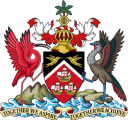Partial Scope Trade Agreement between Trinidad and Tobago and Panama
Trinidad and Tobago and Panama have enjoyed cordial relations since the establishment of diplomatic relations in 1995. Both countries concluded negotiations for a Partial Scope Trade Agreement (PSTA) which was signed in October 2013 and assented to by the President in April 2015. This Agreement was incorporated into Trinidad and Tobago’s law in via Act No. 5 of 2015 and is currently being implemented.
The PSTA is aimed at improving bilateral trade between both countries.
The Agreement is intended to provide access into Panama for 230 products from Trinidad and Tobago, while offering reduced tariffs on 248 products from Panama. Some of the products which were granted access to the Panama market include chewing gum, peanut butter, doors and windows, building blocks, bitumen, aerated water, paper products, tiles and blocks, metal products, plastic and paper containers, other packaging materials, agro processed goods such as cocoa, cereals and nuts.
The PSTA also provides for future negotiation of a Bilateral Investment Treaty (BIT); services liberalization; and additional access for products three (3) years after entry into force.
 Government of the
Republic of Trinidad and Tobago
Government of the
Republic of Trinidad and Tobago
